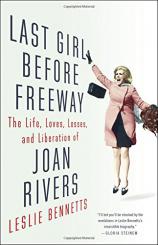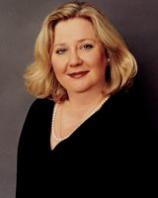Last Girl Before Freeway: The Life, Loves, Losses, and Liberation of Joan Rivers
Review
Last Girl Before Freeway: The Life, Loves, Losses, and Liberation of Joan Rivers
This new, exuberant biography of comedian Joan Rivers takes its title from a story Rivers used to tell about her mother. “I’m the last single girl in Larchmont… My mother is desperate. She has a sign up: ‘Last Girl Before Freeway.’”
Joan Alexandra Molinsky was the second daughter of upwardly aspirant Jewish parents who relocated from Brooklyn to Larchmont, New York, as part of their “hard-won façade of middle-class gentility.” Having an outspoken single daughter who wanted to be a performer was not in their plan of domestic perfection. Not only that, they didn’t think young Joan had any talent. She should abandon her dreams of being a comedian and just find a nice Jewish boy to marry. So she tried that…for a time. But nothing could quell the desire she felt to perform in front of people --- to make a room full of strangers laugh. No other high on the planet could come close. Even when threatened with being cut off financially, or their other drastic gambit, to have Joan committed to a mental hospital, she refused to relinquish her dreams. Despite her parents and the naysayers, and being told that comedy was a man’s world at every turn, nothing would keep Joan from her path to the stage.
After changing her last name to Rivers, there was no stopping Joan. She appeared at any darkened comedy club that would have her. These nights of going on at 2am to a mostly drunk crowd, of being booed off stage, of losing her spot to another comic --- these were the travails that helped the young comedian hone her material and taught her how to command a room. After watching comics like Woody Allen and Lenny Bruce, Rivers learned what she had to offer, which ironically was what everyone told her was her weak spot --- that she was a woman in a man’s world. This could be what she could bring to audiences --- her unique point of view of being a woman trying to make it in this male-dominated world. But were comedy club audiences of the 1960s ready to hear it?
When Rivers felt she was not making any headway in the club scene in New York, she headed to Chicago and the historic comedy breeding ground of the Second City, where she finally figured out “that my personal, private sense of humor, my view of the world, could make smart adults laugh.” She took this newfound confidence with her when she returned to New York and incorporated it into her stand-up act: “As the waves of laughter washed over her, Rivers felt as if a dam had broken…. My comedy could flow from that poor, vulnerable schlep Joan Molinsky…. At last I had become hurt enough, upset enough, angry enough to expose her onstage --- and in my act from that night on, the pain kept spilling and spilling and spilling.”
"Leslie Bennetts chronicles Rivers’ hard work and risk-taking in compulsively readable detail (including new information never before revealed about her feud with Carson)."
All these years of slogging away were starting to pay off for Rivers when the booker for “The Tonight Show Starring Johnny Carson,” which was then based in New York, gave her a shot. The night was perfect; every joke landed, and her chemistry with Carson was undeniable. By the time she was finished, he pronounced, “God, you’re funny. You’re going to be a star.” And that 10 minutes of television knocked down all those doors that had previously closed in Rivers’ face. “Ten minutes on television, and it was all over,” Rivers said. This one appearance catapulted her into the comedy stratosphere. Not only did her bookings increase and improve, she found herself the favorite “daughter” of comedy godfather Carson, who appointed her his regular guest host.
But with every classic story of a meteoric rise comes the inevitable fall. After many years of being Carson’s faithful fill-in, Rivers started to wonder about her future. Not helping the situation was the random voices in her ear, giving her advice, including her husband Edgar Rosenberg, who acted as her manager/producer. After being told of a leaked NBC memo that listed the possible successors to Carson’s job (Rivers’ name was not among them), she allowed herself to be wooed by the upstart FOX network with a late-night show of her very own that Edgar would produce.
The downside was that she would be in direct competition with the man who started her on the road to TV success. When Carson got wind of this, he viewed it as a betrayal of the worst kind and cut off all ties to Rivers, refusing to speak to her ever again. And her new show did not find the kindest audience. The critics were brutal: “They said things like ‘No need, Johnny, to lose sleep over the new challenger.’… Tom Shales wrote in the Washington Post, ‘Maybe Rivers should spend less time at the beauty parlor and more time with her writers. The beauty parlor would appear to be a lost cause anyway.’” Can you imagine a review like that being written for a male host? When the inevitable happened and her show was canceled, and with the rift with Carson being so public, Rivers had a hard time getting booked anywhere --- for any gig. And at her lowest point, her marriage started to suffer. Blaming himself for all her troubles, Edgar committed suicide in a hotel room in Philadelphia.
Never one for self-pity, Rivers drew on her enormous personal strength and iron-clad work ethic, and climbed her way back from the depths of personal and professional exile. She started appearing on the fledgling QVC network, selling jewelry, which became the popular and profitable jewel in the shopping network’s crown. She did whatever stand-up dates she could muster, and tried to work on her relationship with her daughter, Melissa, which had been strained in the wake of Edgar’s death. When the offer of a daytime talk show emerged, Rivers jumped at the chance, and with the lessons she learned from her previous TV failure, she was a hit.
The show lasted five years, and it gave Rivers the platforms on which to build future side-careers, including her later gig as “Fashion Police” host, bringing a whole new viewpoint to the award shows: what the stars were wearing on the red carpet. And in her later years, her obsession with plastic surgery was often the fodder for tabloids and male comics. (She once told Anderson Cooper that she had undergone over “729 cosmetic surgery procedures. She joked about having had so many that for every 10 she did, she got one free.” She later claimed that she was kidding about the number and was in fact much lower.)
Right up until her death at age 81, Rivers was working more than most comics one-third her age. Like or hate her comedy, her influence can be seen in the female comics of today, including Amy Schumer and Chelsea Handler. And in LAST GIRL BEFORE FREEWAY, author Leslie Bennetts chronicles Rivers’ hard work and risk-taking in compulsively readable detail (including new information never before revealed about her feud with Carson). Realizing early on that you can’t succeed merely by being outspoken and razor-tongued, Rivers always felt there was a more important quality to getting ahead that trumped talent and irreverence: “To maintain success, stamina is more important than talent…. You have to be a marathon runner.” And she was, right up until the end.
Reviewed by Bronwyn Miller on November 18, 2016
Last Girl Before Freeway: The Life, Loves, Losses, and Liberation of Joan Rivers
- Publication Date: November 15, 2016
- Genres: Biography, Entertainment, Nonfiction, Performing Arts
- Hardcover: 432 pages
- Publisher: Little, Brown and Company
- ISBN-10: 0316261300
- ISBN-13: 9780316261302





